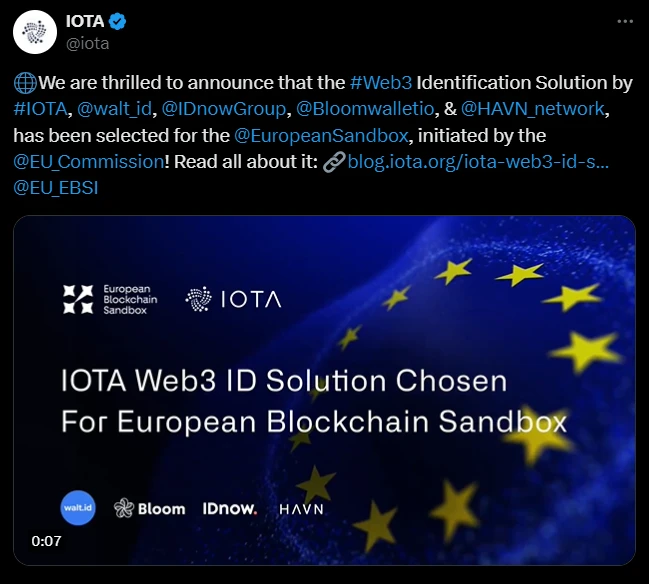
On June 13, the European Commission unveiled the participants selected for the second cohort of the European Blockchain Sandbox initiative (EBSI), among which Iota stands out as a notable entry.
Iota, a well-established entity in the open-source distributed ledger and cryptocurrency domain, has been chosen for its innovative Web3 Identification solution, a project in collaboration with Walt.id, IDnow, Bloom Wallet, and HAVN.
Addressing Challenges of Traditional KYC Processes
The inclusion of Iota’s Web3 ID solution in EBSI signifies a pivotal advancement for the identity management technology. The project aims to address the challenges associated with traditional Know Your Customer (KYC) processes that are typically marked by high costs, inefficiencies, and privacy concerns.
Iota’s approach proposes a reusable KYC system that leverages distributed ledger technology (DLT) and tokenization, thereby enhancing security and granting users greater control over their personal data.
As part of this solution, the KYC process begins with remote identification handled by IDnow, ensuring adherence to EU Anti-Money Laundering (AML) and KYC regulations.

Once verified, the identity is tokenized and stored in a user’s wallet as a soulbound token, which can be utilized across various Web3 applications to confirm identity without disclosing personal details.
The European Commission initiated the EBSI in 2023, aiming to provide a controlled testing environment for DLT solutions across diverse industries.
The sandbox allows up to 20 projects per cohort, offering them opportunities for practical testing, validation, and direct engagement with regulators from across the European Union.
The selection of projects alongside Iota includes diverse applications such as the RealEstate.Exchange (REX) by DigiShares, focused on blockchain solutions for real estate, DoxyChain which targets documents and business processes, Hacken which is involved in smart contract and blockchain security analysis, and Origintrail which integrates artificial intelligence into knowledge infrastructure.
A Timely Initiative Aligning with EU’s Digital Identity Push
This initiative by the European Commission is timely, given the active pursuit of a comprehensive digital ID scheme within the EU. A significant update to the European Digital Identity (EUDI) regulation on May 21 set forth the full implementation requirements by 2026.
This regulation mandates member states to provide at least one EU digital identity wallet to all citizens and residents, intended for use in electronically signing and storing various documents such as university diplomas and train tickets, showcasing a forward-thinking approach in enhancing how European citizens live and work.
Moreover, the concept of zero-knowledge proofs is under consideration for the creation and implementation of these digital ID wallets, reflecting an innovative stride towards privacy and security.
In a broader context, the digital identity sector is experiencing widespread innovation, as evidenced by The Open Network blockchain ecosystem’s recent initiative.
It has dedicated $5 million in Toncoin (TON) tokens to encourage users to verify their identity using advanced palm scanning technology.
This move is indicative of a global trend towards developing digital identity solutions in an increasingly digital world, marking a significant step forward in regulatory discussions and implementations surrounding KYC and privacy within a Web3 framework as initiated by Iota’s participation in the EBSI.






